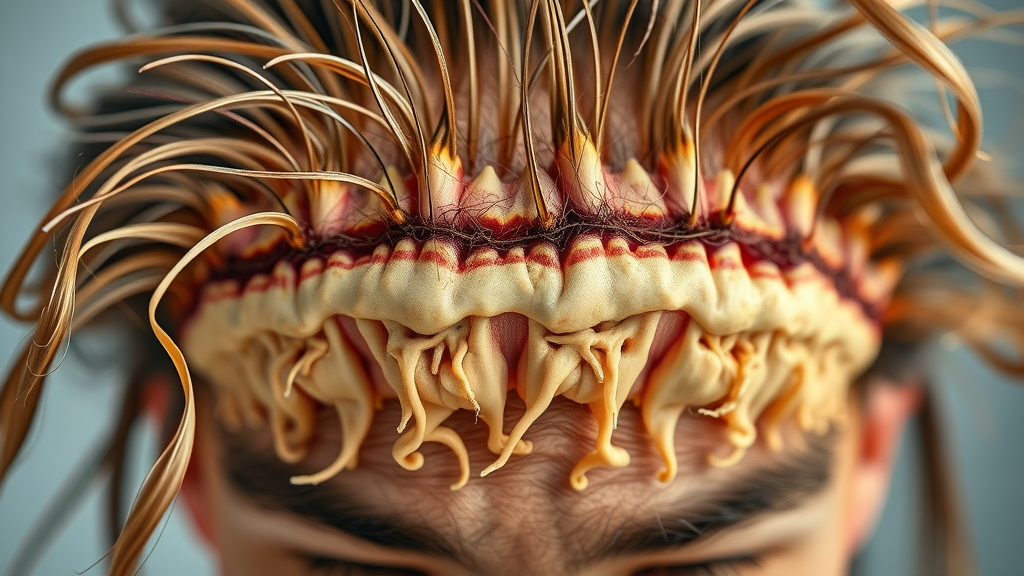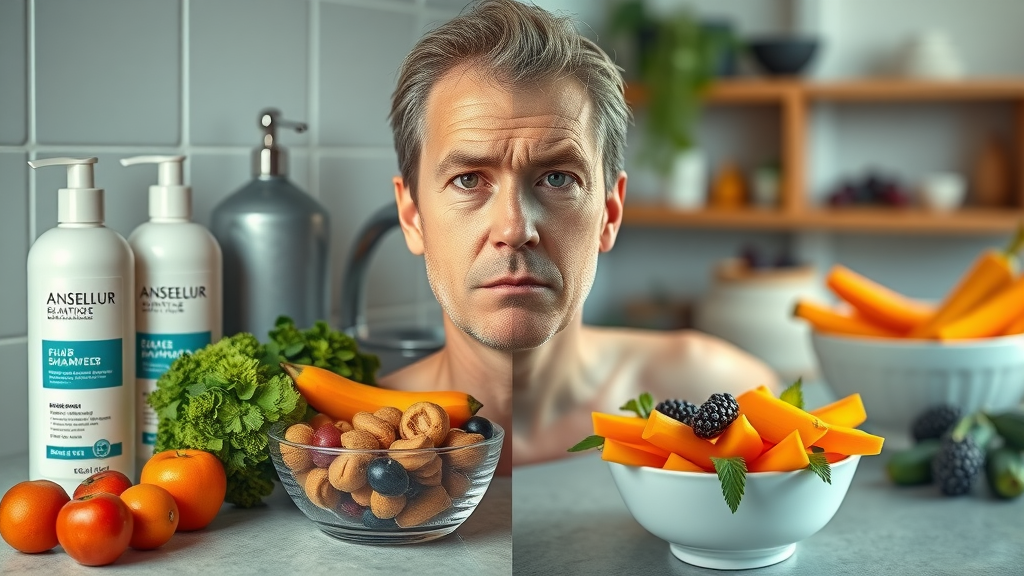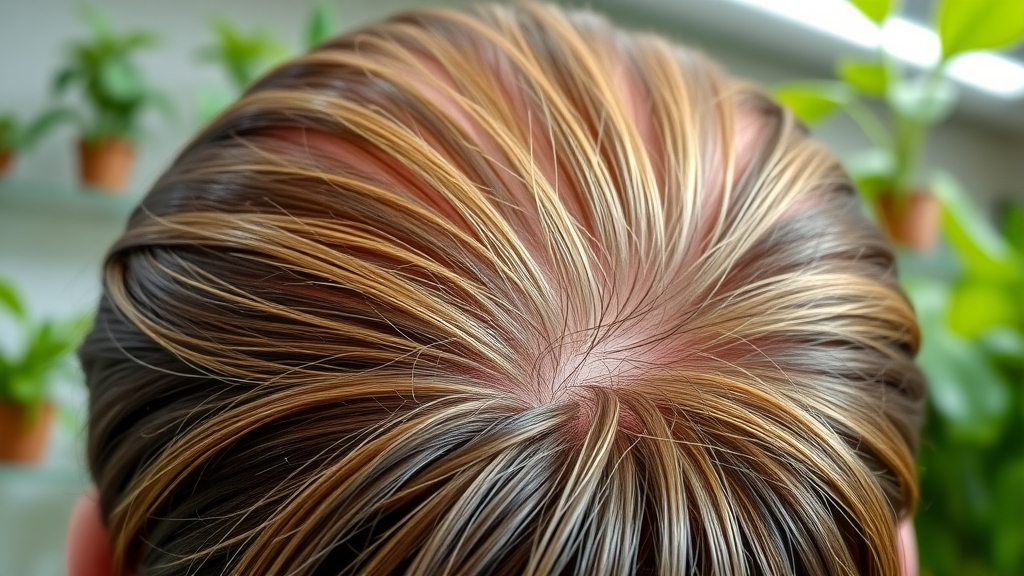“Did you know that over 80% of hair loss cases are connected to poor nutrition and vitamin deficiencies? Unlocking the secrets of hair nutrition could transform your strands in just weeks.”
Are you struggling with slow hair growth or unexpected hair loss? You might be missing a crucial piece—nutrition. The health and vitality of your hair don’t just rely on expensive products or fancy treatments; real change begins inside, with the nutrients you feed your body. Hair nutrition isn’t just a buzzword—understanding and acting on it could be the fastest way to thicker, stronger hair.
Do you want to know which foods and vitamins can combat hair loss, how to spot nutrition gaps, or which habits give you an instant edge in achieving your healthiest hair? Dive in and learn the hard science and immediate strategies that leave shampoos and quick fixes in the dust. Unlock your path to healthy hair—starting today!
Hair Nutrition: Why It Matters for Hair Growth, Strength, and Hair Loss Prevention
- Understanding the relationship between hair nutrition and healthy hair
- The role of nutrients in combating hair loss and promoting hair growth
- Scientific evidence behind nutritional support for hair grow
When it comes to hair growth and preventing hair loss , your daily nutrition plays an outsized role. Hair follicles are one of the fastest-dividing cell types in the body, quickly reflecting any lack or abundance of nutrients. Research consistently shows that nutritional deficiencies —especially in essential vitamins and minerals—can contribute to hair thinning, breakage, and even trigger severe conditions like telogen effluvium (temporary shedding) or alopecia areata (spot baldness).
Eating a balanced diet rich in the right nutrients helps to support hair growth at the root, ensuring each strand receives what it needs to fully develop. Studies using laboratory tests on those experiencing unexplained hair loss often reveal deficiencies in iron, vitamin D, and essential fatty acids. This reality has led scientists to conclude that improving hair nutrition isn't just important for growth and strength—it's a non-negotiable foundation for keeping hair healthy . When you supply your body with the proper fuel, you give your hair the best chance to stay thick, vibrant, and resilient.

The Science of Hair Nutrition and Hair Health
- Anatomy of hair and how nutrition influences hair grow
- How vitamins and minerals serve as building blocks for healthy hair
- Linking nutritional deficiencies to hair loss
The journey to healthy hair begins at the root—literally. Each hair follicle relies on blood vessels to deliver essential nutrients for growth. Proteins form the structural basis of your hair, but the real magic happens when vitamins and minerals support these processes. Vitamins like biotin, vitamin C, and folic acid act as catalysts, speeding up cell growth and supporting collagen production, which directly promote hair growth and elasticity.
Deficiencies in these essential nutrients can interrupt the natural growth cycle, leading to weak, dull, or thinning hair. For example, a lack of iron or zinc impacts oxygen delivery and cell repair, causing strands to shed or break. Many hair loss cases, including male pattern and female pattern types or telogen effluvium , have a direct link to gaps in hair nutrition . Ensuring an ample supply of vitamins and minerals encourages hair follicles to stay active and produce new strands instead of entering a dormant state of rest or shedding.
In essence, optimal hair nutrition forms the bedrock for the health and natural resilience of your hair, warding off oxidative stress and external damage.
What You'll Gain from Mastering Hair Nutrition
- Clear guidelines on nutrients for hair growth and strong, healthy hair
- Insights into correcting nutritional deficiencies affecting hair grow
- Effective strategies to boost hair nutrition instantly
Mastering hair nutrition arms you with the knowledge and tools to prevent and address hair loss , rather than just reacting to hair problems after they appear. You'll learn exactly what nutrients your hair needs to thrive and how to incorporate them into everyday eating habits. If you've ever wondered how to correct nutritional deficiencies and get results fast, these strategies deliver.
By focusing on the right combination of vitamins and minerals , protein, and fatty acids, you’ll discover how to promote hair growth , improve shine and texture, and reinforce your scalp health. Whether you want to get thicker hair, recover from shedding, or develop a lifelong plan for healthy hair , investing in your hair nutrition pays huge dividends you’ll see and feel every day.
| Nutrient | Function | Food Sources | Benefit for Hair |
|---|---|---|---|
| Biotin | Cell growth, keratin production | Eggs, nuts, whole grains | Promotes hair growth, strengthens hair |
| Vitamin D | Stimulates hair follicle cycles | Fatty fish, fortified foods, sunlight | Prevents hair loss, supports new growth |
| Iron | Oxygen transport to follicles | Lean meat, spinach, lentils | Prevents shedding, improves thickness |
| Zinc | Cell repair, oil production | Nuts, seeds, seafood | Reduces dandruff, supports scalp health |
| Folic Acid | DNA synthesis, tissue growth | Leafy greens, beans, citrus fruits | Increases density and strength |
| Vitamin E, A, C | Antioxidants, circulation | Avocado, carrots, berries | Reduces free radical damage, improves shine |
| Omega-3/6 Fatty Acids | Scalp moisture, anti-inflammatory | Fish oil, walnuts, flaxseed | Boosts shine, prevents dryness and breakage |
Vital Vitamins and Minerals for Optimal Hair Nutrition
Top Essential Nutrients Backed by Research for Hair Grow
- Biotin: legend of hair growth
- Vitamin D and hair health
- Iron and zinc in preventing hair loss
- Folic acid’s contribution to hair thickness
- Vitamins E, A and C for scalp health
- How vitamins and minerals deficiencies lead to nutritional deficiencies linked to hair loss
Some essential nutrients play a starring role in keeping hair healthy and thick. Biotin is famous for stimulating keratin —the protein building block crucial for growth and strength. Vitamin D is vital too, since it helps “wake up” dormant hair follicles , making it a must for anyone struggling to promote hair growth or regrow thin patches. Iron and zinc are key for oxygen transport and scalp repair—when you’re low on either, you’re at risk for hair loss . Folic acid delivers density and bounce, while vitamins E, A, and C shield follicles from free radical and oxidative stress that can speed up shedding and aging.
Unfortunately, vitamin and mineral deficiencies are among the top causes of nutritional deficiencies linked to hair loss . If your diet lacks these nutrients, your hair quickly becomes limp, brittle, or starts to fall out in more noticeable quantities. Correcting deficiencies with a targeted diet and supplements is often the fastest way to return to a healthy hair growth cycle.
“A deficiency in iron, zinc, or folic acid is frequently discovered in patients experiencing chronic hair loss and thinning.” — Trichology Journal

Including Fatty Acids and Healthy Fats in Your Hair Nutrition Plan
Omega Fatty Acids: Why Hair Nutrition Needs Healthy Fats
- Role of omega-3 and omega-6 fatty acids in scalp nourishment
- Plant-based sources versus fish-derived omega fats for hair health
- Incorporating healthy fats into a daily hair nutrition regimen
While vitamins and minerals get much attention, don’t overlook the importance of omega-3 and omega-6 fatty acids for hair health . These healthy fats play a vital role in moisturizing the scalp, protecting cell membranes, and reducing inflammation that can impede hair growth . Deficiency in essential fatty acids can lead to dry scalp, brittle strands, and even accelerated hair loss .
You can get these essential fatty acids from both animal and plant sources. Fatty fish (like salmon and sardines) are a good source of omega-3s, while walnuts, chia seeds, flaxseed, and avocado deliver ample plant-based options. Including these healthy fats with every meal helps nourish hair follicles from the inside out and supports a glossy, resilient look.
To make the most of your hair nutrition regimen, strive to add a portion of fish, nuts, or seeds to your meals each day—or consider a high-quality fish oil supplement if your diet lacks variety. The payoff? Hydrated, flexible hair that’s less prone to breakage or split ends, plus a scalp environment that truly supports new growth.
Understanding Nutritional Deficiencies That Impact Hair Grow
- Common signs your hair is lacking essential nutrients
- Identifying gaps in your diet affecting hair growth and causing hair loss
- How to remedy nutritional deficiencies for healthy hair
If your hair seems dull, falls out easily, or breaks with minimal tension, it could signal a deeper issue—a lack of essential nutrients . Nutritional deficiencies are notorious for manifesting in ways like dry, itchy scalp, slowed hair growth , or increased shedding. Other signs include faded hair color, excessive thinning, and even slow regrowth after a trim or cut.
Identifying dietary gaps involves taking a hard look at what’s missing. Skipping meals, relying on highly processed foods, and cutting out entire food groups (like lean proteins or healthy fats) can set the stage for hair loss . Crash diets or restrictive eating patterns are common culprits, leaving the body without the fuel it needs for cellular repair and new growth.
Fortunately, these issues are almost always reversible. Focus on incorporating a broad spectrum of vitamins and minerals —eat the rainbow with fruits and veggies, choose whole grains, increase your intake of lean meat , nuts, and seeds, and don’t forget plant-based and omega-rich foods. If you suspect a long-term deficiency, consult a healthcare provider for laboratory test confirmation and a treatment plan.

Practical Hair Nutrition Tips to Boost Hair Growth and Strength Instantly
Balanced Diet Strategies for Hair Nutrition
- How to build nutrient-rich meals for optimal hair grow
- Superfoods that promote healthy hair and prevent hair loss
Building a nutrient-rich meal plan for rapid hair growth isn’t complicated—it simply means thinking about variety and color with every dish. Base your meals around lean proteins like eggs, poultry, or legumes, as these provide the amino acids crucial for building the structure of each strand. Layer in vibrant fruits and vegetables, which deliver vitamins and minerals essential for hair health . Round out your plate with whole grains for steady energy and healthy fats like olive oil or avocado to lock in moisture and add shine.
Superfoods that promote hair growth and fight hair loss include spinach (iron, folic acid), salmon (omega-3s, vitamin D), sweet potatoes (beta-carotene), and nuts (zinc, biotin, healthy fats). The secret is simple: eat a varied, minimally-processed diet full of essential nutrients and your hair will quickly reflect the benefits.
Supplements for Enhanced Hair Nutrition
- Best vitamin and mineral supplements for hair growth
- Folic acid and biotin: do they work?
- When supplements are necessary for optimal hair health
- Choosing quality hair nutrition supplements
Supplements can be a powerful ally if you’re unable to meet your hair nutrition needs through food alone. The best options for hair growth include biotin , folic acid , and vitamin D , as well as multi-nutrient formulas containing iron, zinc, and omega-3s. Numerous studies confirm the effectiveness of targeted supplements in reversing some types of hair loss —especially those caused by nutritional deficiencies or poor dietary habits.
However, not all supplements are created equal. Look for reputable brands, and check that the product includes forms and dosages backed by research. Remember, supplementation is not a replacement for a solid diet; instead, it’s designed to fill specific nutritional gaps. Before starting any supplement routine, talk to your doctor or a registered dietitian—especially if you have underlying health conditions or are taking other medications.
People Also Ask: What is the Best Nutrition for Your Hair?
Answer: The best nutrition for hair focuses on a balance of proteins, vitamins, minerals, healthy fats, and sufficient hydration. Consuming a variety of nutrient-dense foods and, if necessary, adding specific supplements can greatly improve hair growth, thickness, and scalp health. Key components include biotin, iron, vitamin D, zinc, and omega-3 fatty acids.
People Also Ask: What Nutrient Helps Regrow Hair?
Answer: Biotin, iron, vitamin D, zinc, and folic acid are widely recognized for their roles in reversing hair loss and supporting regrowth. These nutrients contribute to stronger hair follicles and help address underlying nutritional deficiencies that inhibit hair grow.
People Also Ask: Which Nutrient Deficiency Causes Hair?
Answer: Deficiencies in iron, biotin, zinc, vitamin D, and folic acid are linked to hair loss, thinning, and slow regrowth. Ensuring your hair nutrition plan addresses these gaps is essential for preventing and reversing such issues.

People Also Ask: How to Give Proper Nutrition to Hair?
Answer: Adopt a diet rich in whole foods—lean proteins, leafy greens, healthy fats—supplement with vitamins and minerals as needed, avoid crash diets, and keep hydrated. Regular scalp massage can improve absorption of nutrients and promote circulation for improved hair health.
Easy Lists: Daily Hair Nutrition Habits for Strong, Healthy Hair
- Eat a rainbow of fruits and vegetables
- Choose whole grains over refined carbs
- Incorporate nuts, seeds, and fatty acid-rich foods regularly
- Don’t skip on lean proteins
- Reduce sugar and processed foods
- Stay hydrated
- Consider a multivitamin for hair nutrition support
- Massage your scalp daily
- Limit heat styling and harsh chemicals
“Your hair is a reflection of your overall nutrition—feed it well, and it will thrive.”

Real Success Stories: Transformations Achieved Through Hair Nutrition
- Case study: Overcoming hair loss with targeted vitamins and minerals
- Before-and-after results: Hair strength after adding healthy fats and folic acid
Many people have seen remarkable changes after correcting nutritional deficiencies and focusing on hair nutrition . In one case, a young woman with chronic hair loss and thinning tried every topical product with little success. After a laboratory test revealed low iron and folic acid, she adopted an iron-rich and folate-boosted diet, supplemented with biotin. Within weeks, she noticed less shedding, stronger strands, and visible new growth.
Another success story comes from a man in his early thirties, struggling with dull, brittle hair from years of processed fast food. By consistently adding omega-rich fatty fish, nuts, and leafy greens to his weekly meals, and moderating heat styling and chemical treatments, his hair improved in density, regained natural shine, and breakage drastically decreased—proving firsthand how small changes in hair nutrition can deliver huge shifts in hair health .
Common Misconceptions About Hair Nutrition Exposed
- Myth: Expensive shampoos can replace poor nutrition
- Myth: All supplements are equally effective for hair growth
- Fact: Balanced nutrition trumps any quick-fix product
It’s easy to believe the hype around premium shampoos or celebrity supplement endorsements, but the foundation for healthy hair is always proper hair nutrition . No topical solution can fully counteract the impact of a poor diet. Likewise, not all supplements are created equal; only those targeted to your nutritional needs help fill the gaps that promote hair strength and growth. The real fact? A balanced diet loaded with essential nutrients will always deliver longer-term benefits for hair health than any single quick-fix product.

Powerful Meal Plans and Recipes for Superior Hair Nutrition
- Sample one-day meal plan designed for hair growth
- Recipe: Omega-rich breakfast for healthy hair
- Lunch idea: Iron and folic acid-packed salad
- Dinner: Lean protein and leafy greens for healthy hair
If you’re ready to put hair nutrition into action, try this power-packed sample meal plan:
- Breakfast: Smoked salmon and avocado toast (omega-3, vitamin D, healthy fats) on whole grain bread, plus a cup of berries (vitamin C, antioxidants).
- Lunch: Spinach salad with grilled chicken, pumpkin seeds (iron, zinc), quinoa, cherry tomatoes, and lemon vinaigrette (folic acid, vitamin E).
- Dinner: Stir-fried tofu or lean beef with mixed leafy greens, sweet potato, and sautéed bell peppers (protein, beta-carotene, vitamin C).
Snack on nuts, seeds, and carrot sticks throughout the day to sustain hair nutrition . Each meal delivers a variety of essential nutrients to target hair growth, strength, and shine.
Expert Answers: FAQs on Hair Nutrition, Hair Loss, and Growth
-
Is hair nutrition more important than topical hair products?
Nutrition builds true hair health from the inside, while topical products offer only surface results. For lasting impact, prioritize nutrients that support each hair follicle and overall scalp health. -
How long before you see results from improved hair nutrition?
Noticeable changes often begin within 4-8 weeks with consistent changes—such as stronger, shinier strands and reduced shedding. Because hair grows at about half an inch per month, visible differences may continue to reveal themselves over several months. -
Are plant-based diets suitable for hair growth?
Yes, as long as they are well-planned and include plant sources of key nutrients—such as legumes, nuts, seeds, leafy greens, and whole grains. Supplement with vitamin B12, iron, and omega-3s as needed. -
Can you reverse genetic hair loss through nutrition?
While diet can't override genetics (as in male pattern and female pattern baldness), proper nutrition may slow progression and significantly improve remaining hair health and appearance.
Summary of Key Insights for Hair Nutrition and Growth
- Hair nutrition is foundational to not just hair growth, but also strength and appearance
- Vitamins, minerals, fatty acids, and healthy fats are core components
- Addressing nutritional deficiencies can halt hair loss and spark regrowth
- Practical dietary and lifestyle tips yield noticeable results quickly
Take the First Step: Implement Hair Nutrition Strategies for Vibrant, Healthy Hair Now
- Apply these actionable hair nutrition tips today
- Explore supplements carefully
- Consult a healthcare professional for personalized advice as needed
Start transforming your hair health with these essential tips today—your strands will thank you in weeks!
To enhance your understanding of hair nutrition and its impact on hair growth and strength, consider exploring the following resources:
-
“Foods To Help Hair Growth” : This article from the Cleveland Clinic delves into how dietary choices influence hair health, highlighting specific foods that can stimulate hair growth and prevent hair loss. ( health.clevelandclinic.org )
-
“Best Foods for Hair Growth: What to Eat, Drink & Avoid” : Healthline provides a comprehensive guide on essential nutrients and foods that promote hair growth, along with recommendations on what to avoid for optimal hair health. ( healthline.com )
By incorporating the insights from these resources, you can develop a well-rounded approach to nourishing your hair from within, leading to stronger, healthier strands.
 Add Row
Add Row  Add
Add 




Write A Comment